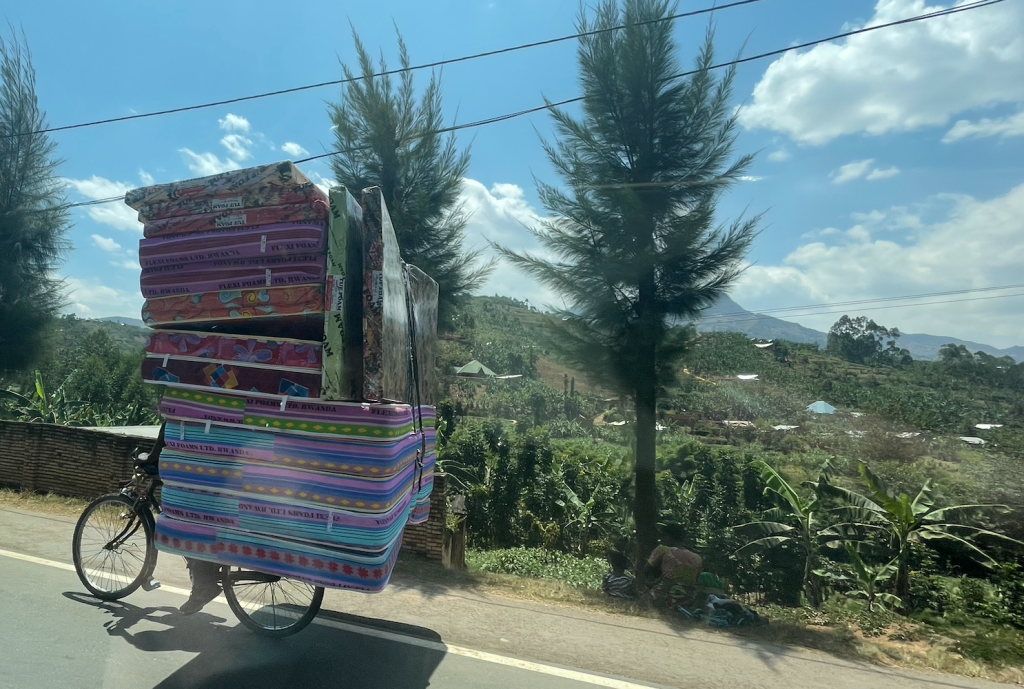In a letter of advice to his son Eduard, Albert Einstein wrote ‘Life is like riding a bicycle. To keep your balance, you must keep moving.’ He wasn’t wrong but that doesn’t mean it’s easy. It is hard to find the resolve to move forward when faced with overwhelming suffering. Yet this is exactly what the people of Rwanda have done. And the humble bicycle has played no small part. I discussed the 1994 Rwandan Genocide, in my previous post. The tragic events took place over just 100 days and claimed around 800,000 lives. They have left a country scarred but not broken. In this post I share some of Rwanda’s remarkable efforts to move forward, from biodiversity, to nation-building, to digitalisation.
It is impossible to reflect Rwanda’s journey over the past three decades in a single blog post. For that reason I have decided to focus on three themes: the environment, society, and governance. Yes, the consultant has reverted to type and is shoehorning ESG into the narrative. Take some comfort, at least, that I have not prepared an accompanying PowerPoint slide-deck. The ESG framework is useful because of how intertwined Rwanda’s progress across each theme is and it allows us to see economic development in a wider context.
Environment
Without a doubt, the first thing you will notice when you arrive in Rwanda is how beautiful it is. The second thing you will notice is how clean it is. If you’re the type who basks in the righteous glow of having picked up some litter on your hike, you will return unfulfilled. There is no rubbish, anywhere. Rwanda began a process to eliminate plastic waste in 2004. Since 2019 the manufacturing, use, importation or sale of plastic bags and single-use plastic items is prohibited. The results are everywhere to not be seen. This policy, much like Ireland’s smoking ban, is proof that ambitious policy, well designed, can be transformative.
As a land-locked and hilly country, Rwanda is not an ideal location for wind turbines. It’s small size and population density increases the opportunity cost of solar farms. In 2020, however, hydropower generated well over half of the country’s electricity. Mototaxis (moped taxis), which number more than 25,000 in the capital, Kigali, are transitioning from petrol to electricity. A Rwandan manufacturer, Ampersand, is driving this: allowing users to exchange empty batteries for charged ones at swap stations across the city.
Rwanda’s greatest environmental treasures are its national parks. Despite its modest size, akin to Munster, Rwanda has protected parkland equal in area to County Limerick. In fact, Rwanda has 3.5 times as much national parkland as the Emerald Isle. These sanctuaries harbour a diverse array of wildlife, including lions, leopards, rhinos, elephants, buffaloes, zebras, and giraffes. Most famous of all are the iconic and endangered mountain gorillas, immortalised by the pioneering work of Dian Fossey. Despite being a poor country, Rwanda has resisted the exploitation of these areas for natural resources.
Society
For a land of peaks and valleys, the prevalence of bicycles, and their many uses is astounding. Pedal power keeps the country moving. Need to get to the next village but don’t have a bike? Simply hire a taxi-bicycle to bring you on their cushioned carrier. Need to move more stuff than you could fit in a Volvo estate but don’t have a Volvo estate? Simply pay someone to bring it on the carrier of their bike. No load is too big. No hill too high. As with Rwanda’s history, cycling is a story of the triumph of hope over suffering. In a real-life Cool Runnings, Rwanda’s national cycling team has seized on this ability and achieved success on the world stage.

Where Ireland has the concept of meitheal, – the coming together of communities to complete work in the common good – Rwanda has umuganda. Umuganda is a national holiday that occurs on the last Saturday of every month. Far from an opportunity to kick-back with a beer, this holiday requires three hours of mandatory community work. Every able adult, including the President, must play their part. Failure to contribute results in a fine. Umuganda embodies Rwanda’s nurturing of collective responsibility, solidarity, and social cohesion.
Rwanda is making great strides in becoming a digital society. Rwandans use mobile fintech to save, take loans, transfer money, and make payments. Setting up a business is remarkably easy due to efforts to cut unnecessary red tape. The tech sector is growing fast.
Governance
Banning single-use plastic, umuganda, and conservation are initiatives that work best with buy in from society. That a poor country, recovering from a devastating genocide, and surrounded by unstable and in some cases hostile neighbours, could prioritise such visionary policies is remarkable. It feels as if Rwanda is somehow managing to put out fires and put in place policies to prevent future fires all at the same time. This may in part be due to Rwanda’s response to the genocide, which placed great emphasis on restorative justice and nation building. Lower-level perpetrators who were remorseful would apologise to communities in local courts, where survivors had a chance to share their pain. We in Ireland know all too well the difficulty of overcoming bitter conflict. Rwanda could have spiralled into decades of revenge and retribution but its people chose a different route.
Another striking aspect of Rwandan society is how safe it feels. As a tall, white (and rapidly turning red) man, it is fair to say that I attracted a lot of attention when out and about, especially in rural areas. Groups of young people flocked to the stranger, but in a joyous, warm, and curious manner. Never once did I feel threatened, no matter what corner I turned. This is in stark contrast to my experience in some Western cities, where the stakes are often lower. People loved the opportunity to practice their English, to hear what I thought of their country, to tell me how much they loved Arsenal. They spoke optimistically about their future, and passionately about the important work that Rwanda is doing in protecting the environment and biodiversity.
Another source of pride for Rwanda is that it has the highest female participation in politics of any country in the world. In 2023, 61.3 percent of the Rwandan parliament were women – well above the 30 percent quota. Women are also very active in the labour force. This is in part a result of the genocide, in much the same way that the two World Wars fundamentally changed the role of women in western societies.
It’s a long way to Utopia
While making major efforts to protect the environment and build a cohesive society, Rwanda’s economy has also thrived. Its economy is among the fastest growing in Africa. In 2023 output grew by 10 percent, driven largely by the technology and hospitality sectors. Rwanda is promoting international trade and is party to the African Continental Free Trade Agreement. Described as the Switzerland of Africa, Rwanda is becoming a regional destination for conferences and events. This is all made possible by its safe, clean streets, and stable institutions. The country’s economic prospects are further elevated by investment in essential infrastructure, including a major new airport.
None of this is to say that Rwanda is on a course to becoming Utopia. Life is tough for many and the country faces myriad challenges. Climate change is affecting crop yields. Many children are malnourished. Water and sanitation is of poor quality and food poisoning is common. Poverty is widespread. External forces threaten the country’s security while internal forces are accused of political repression. Indeed Rwanda is categorised as ‘not free’ by Freedom House, scoring 23/100 (Ireland scores 97/100). This is due to interference in electoral processes, a lack of pluralism and accountability, and restrictions on civil liberties. These are all serious issues and must not be minimised. However, relative to other developing countries, and where Rwanda found itself just 30 years ago, Rwanda is rising and is a beacon of hope. The Land of a Thousand Hills has much to learn, but there is also much that it can teach the world.
CN
